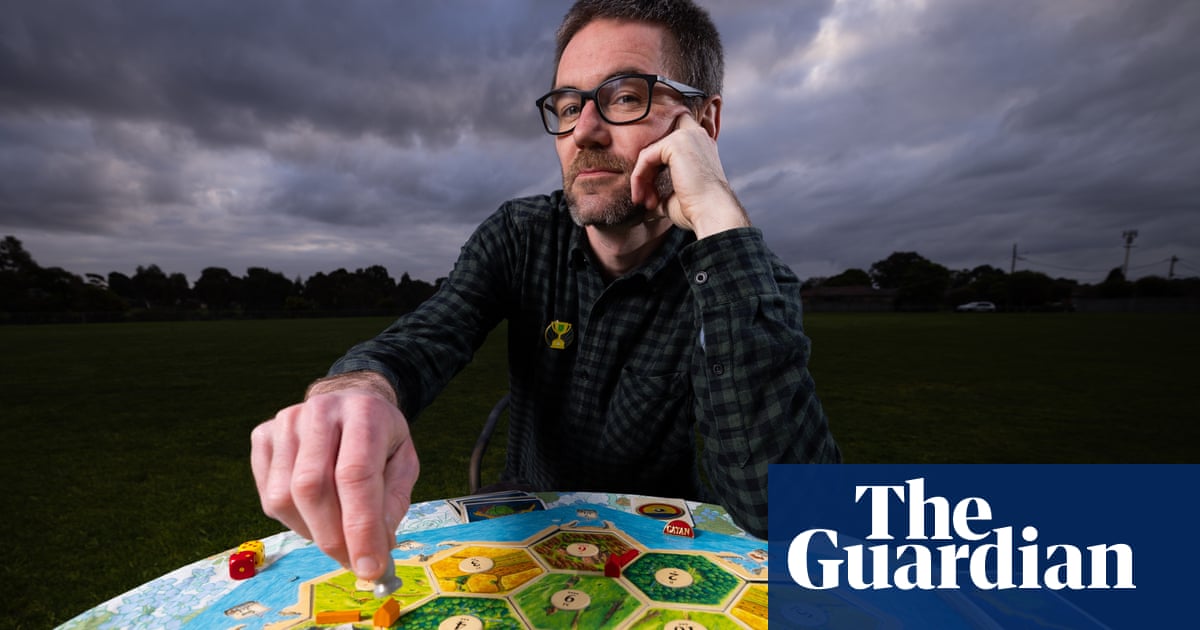
This weekend in Canberra a group of strangers will sit around a table and plot world domination.
That world is the fictional island of Catan, the centrepiece of a board game first published in Germany 1995, which has gone on to sell tens of millions of copies. Formerly known as Settlers of Catan, it has been described as the golf of Silicon Valley tycoons – enthusiasts reportedly include Mark Zuckerberg – and was named by the Wall Street Journal as “the board game of our time”.
Among those competing for the Australian Catan crown – and with it, a shot at the world title – will be the game’s state champions. And they will cut an eclectic and, occasionally, surprising company.
Victoria will send its two-time reigning champ, a 37-year-old factory worker and freestyle rapper who regularly jams with a jazz-funk-hip-hop outfit. Western Australia offers its inaugural winner, a 20-year-old international student of medicine and Catan wunderkind raised in Singapore, Belgium and France. From Queensland comes a 40-year-old transport engineer, and from New South Wales a business strategy consultant still celebrating the birth of his fourth daughter.
All young to middle-aged men in a game in which opponents compete to establish the most successful new colonies and whose world champion is a fast-talking, New Zealand tech bro with a maths PhD.
All, that is, except a retired French and maths teacher, grandmother and Scrabble enthusiast, Francoise Finlayson.
If you take her account of the South Australian Catan championship in June at face value, Finlayson owes her place at the nationals largely to chance.
“I’m the state champion but every other person that was there could have won as easily if the dice had rolled their way,” she says. “I’m probably no better than a lot of people I play against, it’s just I was lucky on that day.”
In the turn-based game, a player’s ability to extract resources and build roads and cities is determined by their roll of the dice.
But Elliot Yap, for one, does not attribute his win in WA to the whims of fate.
While fortune is certainly a factor, Yap says, players can wrest it into their own hands through the strategic positioning of settlements, negotiating trade deals and forging alliances of convenience.
“I’d say it’s about 75% skill, 25% luck,” he says.
Whereas Finlayson says she plays the odd match with a group of board gaming friends who meet every Sunday, Yap has hurled himself deep into online Catan forums and YouTube tutorials.
Yap believes his international upbringing and “brain for statistics” gives him a natural edge.
“It’s just that passion for board games and my social skills that helps me become a great player,” he says.
The Victorian champ, Alex Willey, says it is this delicate balance between luck, skill and psychology that has made Catan such an enduringly popular game – one that he and many other board game connoisseurs considers vastly superior to the more recognised games of earlier generations, most notably Monopoly.
“Catan’s a really well-made game,” Willey says. “It’s fairly friendly and fairly easy to pick up and play … and has a beautiful layer of strategy.”
On one hand, he says, a child as young as seven could learn to play it reasonably well.
“You can pick up and win your first game with barely any understanding,” he says.
“And then you can play 100 more games, and have a rudimentary understanding of the deeper levels of strategy, and still be doing quite well.
“But then it keeps growing in how much you can understand the strategy.”
And Willey admits he goes deep down that rabbit hole.
“A lot deeper than most people would think was worth it or have time for,” he says.
Games begin by randomly laying out the woods, mountains, hills and pastures whose resources players will look to exploit, in effect generating a new island of Catan each time. Then each competitor takes turns to select the positions of their first settlements and roads.
These initial placements, Willey says, are “super crucial”. He says he spent many long nights with his mother, also an avid player, just dealing out new boards, analysing potential settlement places over and over, “without even playing the game”.
Then there is the other element of skill involved in Catan, what Yap calls table talk.
The Queensland champion, Danny Frahm, says this is part of what makes the game “really hard to dislike”.
Because players must trade with one another for resources, it “forces a mentality of friendliness”.
“There are going to be people at the table that are like, ‘Ooww I’m a harsh trader and you have to really give me a good deal’,” he says. “But those guys lose.”
And because players can gang up on who they perceive to be in the lead and bring them back to the pack, Frahm says it’s best to strike an unassuming posture.
“It’s a psychological game, if you really get into it,” he says.
Which may be another reason Finlayson attributes her win in Adelaide to luck.
And it may be the same reason Phil Codrington – who in his day job is advising a private equity firm about entering a new country – says he was “quite lucky” to win the NSW championship and only “entered for the pleasure of having a day of gaming”.
Perhaps he did. And maybe the dice did just roll Finlayson’s way. Or perhaps that is precisely what she wants her younger opponents to believe.












